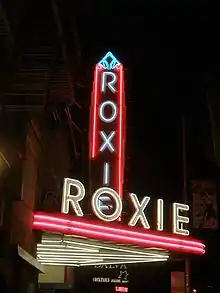Roxie Theater
The Roxie Theater, also known as the Roxie Cinema or just The Roxie, is a historic movie theater, founded in 1912, at 3117 16th Street in the Mission District of San Francisco. It is a non-profit community arthouse cinema.
 The Roxie Theater marquee in 2009 | |
| Location | 3117 16th Street San Francisco, California, U.S. |
|---|---|
| Coordinates | 37°45′53″N 122°25′21″W |
| Type | Movie theater |
| Opened | 1912 |
| Website | |
| www | |
History
The Roxie is one of the oldest continuously operating movie theaters in the US,[1] with its history tracing back to the early 1900s.
The 300-seat theater was renovated in 1933, changed its name to the Roxie, and added its unusual marquee with neon sign but no place for movie titles. In 2003, a 49-seat theater dubbed the Little Roxie opened two doors from the main theater.[2]
Other names for the theater:
- The Poppy 1912–1916
- The New 16th Street 1916–1920
- The Rex 1920–1926
- The Gem 1926–1930
- The Gaiety 1930–1933
- The Roxie 1933–present
In the late 1960s with the decline of its neighborhood, The Roxie became a pornography theater. In March 1976, community leaders Robert Christopher Evans, Dick Gaikowski, Peter Moore, and Tom Mayer bought the Roxie, remodeled it, and turned it into an art and independent film center. Between November 1–15, 1979, the Roxie hosted the U.S. premiere of Luis Buñuel's L'Âge d'Or (1930), a film that had been banned for almost 50 years. Over the years, the Roxie has been home to many film festivals such as the Frameline Film Festival, the San Francisco Jewish Film Festival, the Arab Film Festival, SF Indiefest, and many others.
In December 2005, an agreement was announced under which the Roxie was acquired by New College of California, a small liberal arts college also based in the Mission District. It became part of New College's Media Studies Program on January 1, 2006, and was renamed the "Roxie Film Center at New College". An anonymous benefactor paid off the theater's debts, and the college registered it as a non-profit corporation.[3]
On February 26, 2008, New College announced it was closing, thus ending its support of the Roxie.[3] New College Board member Rod Holt and his son Alan subsequently took over the theater’s lease.
In 2010 Alan Holt transitioned from Executive Director to a seat on the Board and community activist and philanthropist Christopher Statton joined the Roxie as Executive Director and member of the Board.[4] Megan Wilson, who began working for the Roxie as a development consultant, became a co-Executive Director; neither received a salary.[2] Over his four-year tenure, Statton established the Roxie as a community-based non-profit, including the creation of the Roxie's Lights. Camera. Action! Awards to honor Bay Area social justice documentary filmmakers. The inaugural awards honored the filmmaking team of Rob Epstein and Jeffrey Friedman and filmmaker Hima B for their significant contributions in raising awareness of the challenges of living with HIV/AIDS.[2] Statton also raised over $400,000 in contributions to help support the Roxie's programming and operations.[5] In 2013 Statton was awarded the Marlon Riggs Award by the San Francisco Film Critics Circle for "his significant contribution to San Francisco’s film community through the Roxie Theater over the past four years".[6] Statton resigned from the Roxie in 2013 due to health concerns.[5]
In December 2013, the Roxie announced Isabel Fondevila, former Board President of Artists' Television Access, as the new director.[7] She further expanded the theater's film festivals and developed RoxCine, an ongoing series of Spanish-language films.
In 2015, Dave Cowen came aboard as executive director, while Fondevila remained at the Roxie in the role of Director of Programming.[8] Over the next two years, Cowen led the theater to profitability[9] with projection and facilities improvements, an increased social media presence, and a successful focus on showing repertory film in 35mm.[10] During this time, the Roxie's classic neon marquee was fully restored,[11] and the Roxie was honored by the California State Assembly in 2017 as Small Business of the Year.[12]
In August 2017, Sundance veteran Elizabeth O'Malley replaced Cowen as executive director, with Operations Director Lex Sloan promoted to general manager.[13] Cowen remains on the Roxie Board of Directors and is now working with Milwaukee Film on their acquisition of the historic Oriental Theatre.
Roxie Releasing
The theatre also is home to Roxie Releasing, an independent film distributor most notably responsible for the 30th anniversary re-release of George A. Romero's Night of the Living Dead. Roxie Releasing specializes in documentaries.
References
- Mick LaSalle (December 24, 2017). "Roxie Theater, once fading to black, now thriving". San Francisco Chronicle.
- Erin Blackwell (May 23, 2013). "Roxie fundraiser fetes queer filmmakers". Bay Area Reporter.
- Ruthe Stein (February 29, 2008). "College's woes cloud Roxie's future". San Francisco Chronicle.
- Louise Rafkin (April 4, 2010). "The most positive of positive people: On the Couch with Kate and Chris Statton". San Francisco Chronicle.
- Jesse Hamlin (October 24, 2013). "Chris Statton resigns from Roxie Cinema board". San Francisco Chronicle.
- "2013 San Francisco Film Critics Circle Awards".
- G. Allen Johnson (December 25, 2013). "Roxie Theater: New director following her passion". San Francisco Chronicle.
- Jesse Hamlin (October 8, 2015). "Roxie names a new leadership team". San Francisco Chronicle.
- Mick LaSalle (December 23, 2017). "Roxie Theater, once fading to black, now thriving". San Francisco Chronicle.
- Iain Blair (January 17, 2017). "Indie Cinemas Face Challenging Future Together". Variety.
- "Bright idea: Roxie Theater's marquee restored". Capp Street Crap. February 21, 2017. Retrieved January 10, 2018.
- Alyssa Pereira (June 6, 2017). "SF's Roxie Theater, Oakland's Red Bay Coffee among those awarded 'Small Business of the Year'". San Francisco Chronicle.
- "The Roxie Welcomes New Executive Director Elizabeth O'Malley". Roxie. August 21, 2017. Retrieved January 10, 2018.